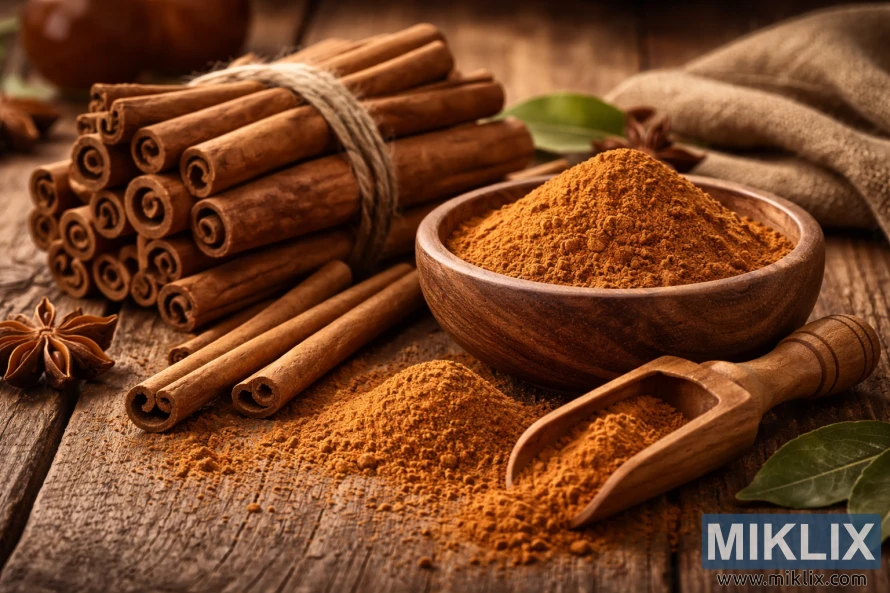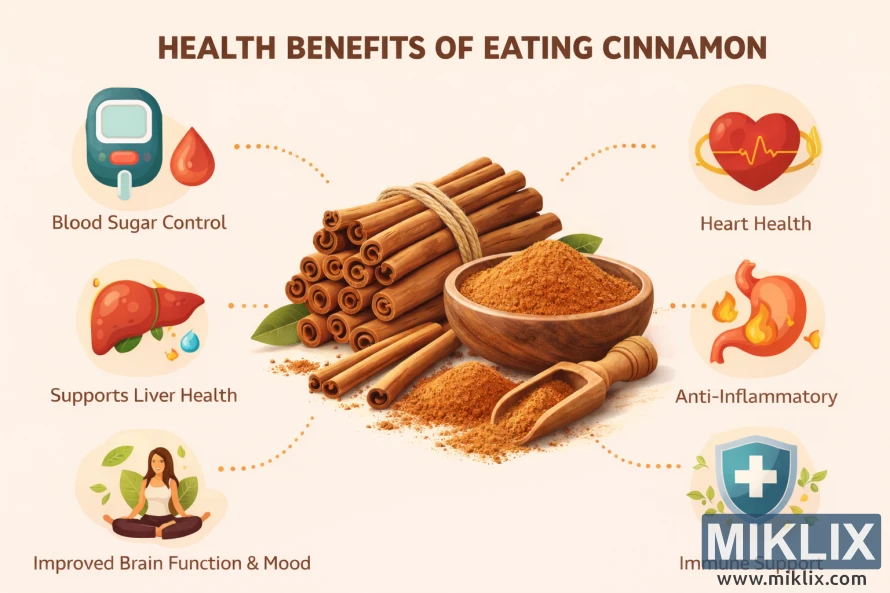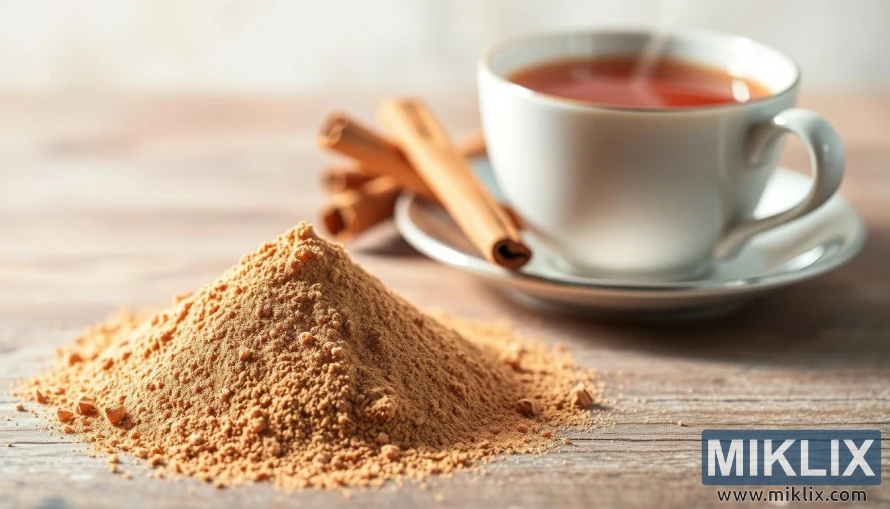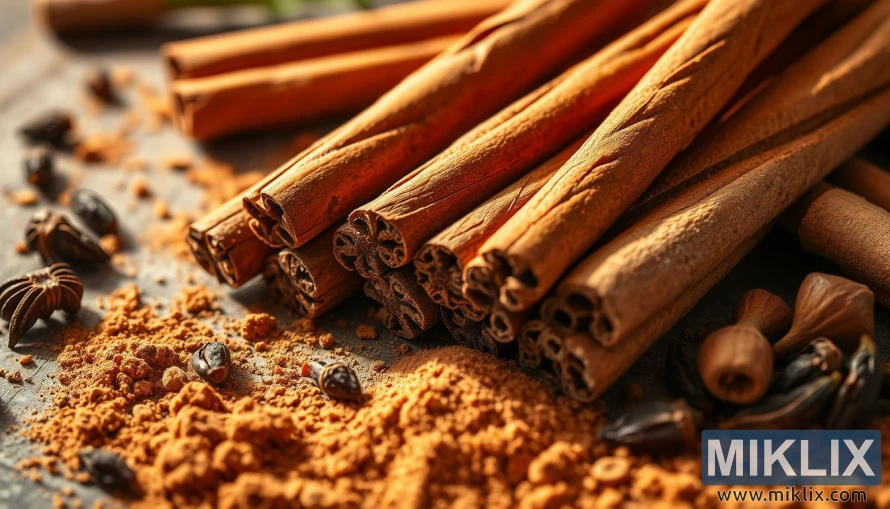Cinnamon’s Secret Powers: Health Benefits That Might Surprise You
Published: April 5, 2025 at 5:26:38 PM UTC
Last updated: January 1, 2026 at 10:56:23 PM UTC
Cinnamon is more than just a spice that adds warmth and flavor to food. It has impressive health benefits too. Its nutritional value goes beyond cooking, thanks to its medicinal properties. Studies show that adding cinnamon to your diet can boost your health in many ways. It's packed with antioxidants, anti-inflammatory, and antimicrobial properties. This makes it great for heart health and managing blood sugar. Adding cinnamon to your daily meals can be a smart move for your health.

Key Takeaways
- Cinnamon offers a variety of health benefits that enhance overall wellness.
- Its medicinal properties can help manage blood sugar levels efficiently.
- The nutritional value of cinnamon is enhanced by its rich antioxidant content.
- Cinnamon helps in reducing inflammation, promoting heart health.
- Incorporating cinnamon into meals can be simple and delicious.
Introduction to Cinnamon
Cinnamon comes from the inner bark of trees in the Cinnamomum family. It adds a unique flavor to many dishes. This spice has a long history, used in different cultures for centuries.
There are two main ways to use cinnamon: sticks and ground powder. Both are loved for their taste and health benefits.
Cinnamon is more than just a spice for cooking. It has been used in natural remedies for a long time. Scientists are studying its possible health benefits.
Cinnamon: A Historical Perspective
Cinnamon has a fascinating history that goes back thousands of years. It was once seen as a valuable treasure, often given to kings and used as money. Its importance in different cultures is clear; it was one of the first spices to travel from the East.
In ancient Egypt, cinnamon played a big role. It was used in medicine, helping to preserve bodies. Its unique taste and smell made it essential for cooking and health.
Over time, cinnamon's fame grew. In Medieval Europe, it became a sign of wealth. Today, studies confirm its health benefits, showing it was a wise choice in ancient medicine.
Powerful Medicinal Properties of Cinnamon
Cinnamon is more than just a tasty spice. It has amazing health benefits. The key ingredient, cinnamaldehyde, and other plant compounds make it very beneficial. These elements help improve health in many ways.
The health benefits of cinnamon are wide-ranging and significant. Some key advantages include:
- Antioxidant effects that protect cells from damage.
- Anti-inflammatory properties that may alleviate chronic inflammation.
- Antimicrobial capabilities that help combat bacteria and fungi.
Adding cinnamon to your meals can boost both taste and health. It's great in oatmeal or savory dishes. This spice is a tasty way to improve your well-being.

Loaded with Antioxidants
Cinnamon is a powerhouse of health benefits, packed with antioxidants. These compounds fight oxidative damage from free radicals. Studies show that cinnamon's antioxidants can boost blood levels and lower inflammation.
Cinnamon beats 26 spices in antioxidant activity, even outshining garlic and oregano. Its compounds, cinnamaldehyde and eugenol, have strong antioxidant and antibacterial effects. Eugenol is as good as traditional antioxidants, and cinnamaldehyde fights off many pathogens.
Cinnamon's antioxidants also make it a natural food preservative. Adding this spice to your meals not only tastes great but also strengthens your body against oxidative stress.
Anti-Inflammatory Properties
Chronic inflammation can lead to many diseases. This makes finding good dietary solutions very important. Cinnamon is a great choice because it has anti-inflammatory benefits.
Studies show that cinnamon extracts from Cinnamomum zeylanicum and Cinnamomum cassia have powerful compounds. These compounds, like E-cinnamaldehyde and o-methoxycinnamaldehyde, help reduce inflammation. They do this by lowering nitric oxide and TNF-α in macrophages.
A study in Phytotherapy Research looked at 12 trials on cinnamon. It found that cinnamon lowered CRP and MDA levels. These are markers of inflammation and oxidative stress. People taking 1.5 to 4 grams of cinnamon powder each day saw these benefits.
A clinical trial with women who had rheumatoid arthritis showed cinnamon's power. A 500 mg dose of cinnamon powder each day lowered CRP and TNF-α levels. After eight weeks, they felt better, with less joint pain and disease activity.
Another study looked at cinnamon water extract. It found that it could block inflammatory pathways. Oral cinnamon extract lowered TNF-α and IL-6 levels. This shows cinnamon's polyphenols can fight inflammation well.
Heart Health Benefits of Cinnamon
Cinnamon is great for your heart health. Studies show it can help with heart disease risk factors. It's known to improve cholesterol levels, which is good for your heart.
Even though one study found no big change in LDL cholesterol, others suggest cinnamon is beneficial. It might help keep your heart healthy in other ways.
A big study looked at nine trials and found cinnamon lowers blood pressure. People who ate cinnamon had lower systolic and diastolic blood pressure. This was true for those who ate up to 2 grams of cinnamon a day for more than eight weeks.
Eating cinnamon regularly can make your heart healthier. It's a simple way to boost your heart's wellness. Adding cinnamon to your diet could be a smart move for your heart.

Improving Insulin Sensitivity
Cinnamon is now known for boosting insulin sensitivity. It's great for those who want to control their blood sugar. Studies show that cinnamon's compounds help insulin work better. This is key for keeping blood sugar stable and energy flowing.
For people with insulin resistance, cinnamon is a big help. It's linked to metabolic syndrome and type 2 diabetes. Adding cinnamon to meals can boost metabolic health. This makes it a good tool for managing blood sugar.
- Cinnamon may enhance glucose uptake by cells, improving insulin sensitivity.
- Regular cinnamon consumption can better regulate blood sugar levels.
- This spice may also lower fasting blood sugar levels.
Adding cinnamon to your daily meals is a simple way to improve health. You can sprinkle it on oatmeal, smoothies, or use it in savory dishes. There are many ways to enjoy it.
Cinnamon’s Role in Weight Management
Studies show cinnamon can help with weight management. It affects how our body uses energy. This can lead to better control over calories.
Cinnamon does more than just curb hunger. It also makes our body better at handling sugar. This helps keep blood sugar levels stable, which is key for losing weight.
Adding cinnamon to your meals can be a fun way to help with weight loss. Try it on oatmeal or in smoothies. There are many ways to enjoy it.
Cinnamon and Neurodegenerative Disease Protection
Cinnamon has become a topic of interest for its brain-protecting qualities. Research shows that cinnamon's compounds can shield brain cells from damage. This is good news for fighting diseases like Alzheimer’s and Parkinson’s.
Animal studies suggest cinnamon can boost motor skills and brain health. This makes cinnamon a tasty way to support the brain, which is important as we age.
Potential Cancer Prevention Properties
Early studies hint that cinnamon might help prevent cancer. It seems that some compounds in cinnamon could stop tumors from growing. They might also help kill cancer cells in animal tests.
This research suggests cinnamon could be beneficial for health, focusing on cancer prevention.
Also, studies on turmeric and cancer are very promising. Turmeric and cinnamon both have special compounds that might fight cancer cells together. Scientists are working hard to understand how these spices can help prevent cancer.
Antimicrobial Effects of Cinnamon
Cinnamon is known for its strong antimicrobial properties, thanks to cinnamaldehyde. This compound fights off bacteria and fungi well. It can even tackle tough bacteria like E. coli and Staphylococcus.
Also, cinnamon can act as a natural preservative. It stops fungal growth, adding to its health benefits. Adding cinnamon to your meals can make food taste better and help keep you healthy.
Cinnamon for Overall Digestive Health
Cinnamon is a tasty addition to your meals and boosts your digestive health. It helps balance the good and bad bacteria in your gut. This balance is key for good digestion.
Cinnamon also has natural prebiotic properties. These help the good bacteria in your gut grow. This is great for your overall gut health.
Cinnamon's anti-inflammatory effects are also important. They can help ease stomach pain and discomfort. This is very helpful for people with irritable bowel syndrome (IBS).
Adding cinnamon to your daily meals can help with many digestive issues. It can make even simple dishes healthier. Try cinnamon in drinks, meals, or as a seasoning to boost your health.

Choosing the Right Type of Cinnamon
When picking cinnamon, knowing the two main types is key. These are Ceylon and Cassia cinnamon. Each has its own special traits that can guide your choice.
Ceylon cinnamon, also called "true cinnamon," is loved for its light taste and scent. It has much less coumarin, a substance that might be harmful in big amounts. On the other hand, Cassia cinnamon is more common and cheaper. It tastes stronger but has more coumarin.
When choosing between Ceylon and Cassia cinnamon, think about these points:
- Health Considerations: Ceylon is safer for daily use because it's less toxic.
- Flavor Preferences: Cassia has a bolder taste that some like in cooking or baking.
- Availability: Ceylon might be tougher to find in stores, but health food stores and online have both.
Knowing the differences between these cinnamon types helps you choose wisely. Use Ceylon for better health benefits. But, enjoy Cassia's strong taste when you want it.
How to Incorporate Cinnamon into Your Diet
Cinnamon is a delightful spice that can easily elevate a variety of dishes. It's great for adding flavor to your daily meals. You can find many simple cinnamon recipes to make your breakfast, snacks, and main courses more delicious.
Adding cinnamon to smoothies is a convenient way to enjoy it. Just a sprinkle can make your smoothie taste better and offer health benefits. Oatmeal is another excellent choice for cinnamon. A little bit can turn an ordinary bowl into a delicious, nutritious treat.
If you love baking, cinnamon is perfect for muffins, cookies, and cakes. It adds warmth and depth to your baked goods.
Savory dishes can also benefit from cinnamon. Try adding it to chili or stews for a unique twist. For a refreshing drink, make cinnamon water or tea. It's a great way to enjoy its benefits without adding many calories.
Cinnamon's versatility makes it a wonderful addition to your diet. Experiment with different dishes and find the perfect way to enjoy this beloved spice.
Conclusion
Cinnamon is more than just a tasty spice. It's packed with health benefits. It helps manage blood sugar, improves heart health, and boosts overall wellbeing. These benefits come from both ancient traditions and modern science.
To get the most out of cinnamon, choose the right type and use it wisely. Add it to oatmeal, smoothies, or savory dishes. This way, you can enjoy its health perks every day.
Adding cinnamon to your diet can make a big difference in your health. It's a natural way to enhance your meals and improve your wellness. So, try cinnamon and see how it can benefit you.

Further Reading
If you enjoyed this post, you may also like these suggestions:
- Gut Feeling: Why Fermented Foods Are Your Body’s Best Friend
- Olives and Olive Oil: The Mediterranean Secret to Longevity
- Small But Mighty: Unlocking the Health Perks of Chia Seeds
